Chances are that you’ll have encountered a music conductor or director in some context as a musician. Big bands, string quartets, rock choirs, and symphony orchestras alike are rarely found without someone waving their hands around in front of a sea of performers. But you might be asking, exactly what does a music conductor do? If I can read my music, keep time, and have done sufficient practice, how important is a conductor in music anyway?
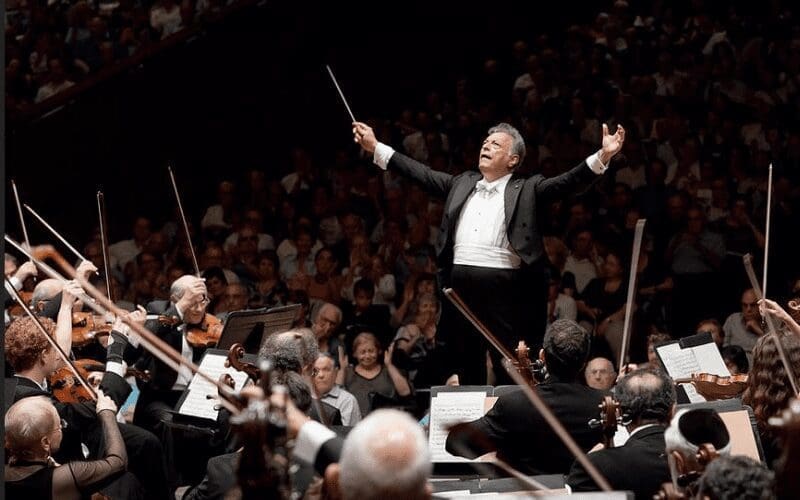
This article should clear up a lot of these questions. As well as giving guidance on salaries and how to become a music conductor yourself if you’re ready to embark on that path.
Have you got what it takes? Let’s find out!
What Is A Music Conductor?
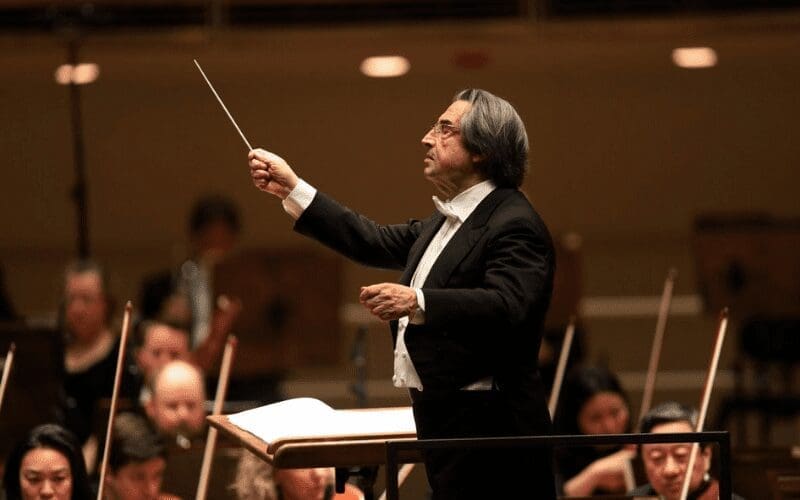
The most frequent question asked of the leader of an ensemble is: what does a music conductor do? Are they even really necessary?
Short answers – a lot! And yes! It’s safe to say music conductors are vital for performing ensembles. With large orchestras the conductor serves to unify an ensemble’s sense of tempo, beat, and ‘feel’.
The music conductor of a symphony orchestra, however, is bound by very different conventions to that of a gospel choir conductor. Equally the expectations and demands from a conductor vary with the ability of the performers they lead.
People often think of conductors as slightly eccentric extroverts. Being front and centre in full display, waving their hands around. A music conductor’s visibility, however, is absolutely crucial in helping them communicate to the whole group.
As well as helping the ensemble see all the tempo and entry indicators the conductor is giving, having some distance from the ensemble allows the conductor to better hear the overall sound and make adjustments. Such as indicating to the horns they should turn it down because they’re drowning out the strings.
Perhaps the most exciting is the creativity a conductor can exercise to put their innovative stamp on the music. A conductor’s gestures can convey energy, dynamics and emotion! That’s a lot of power in the music conductor’s hands!
What Is The Role Of A Conductor In An Orchestra?
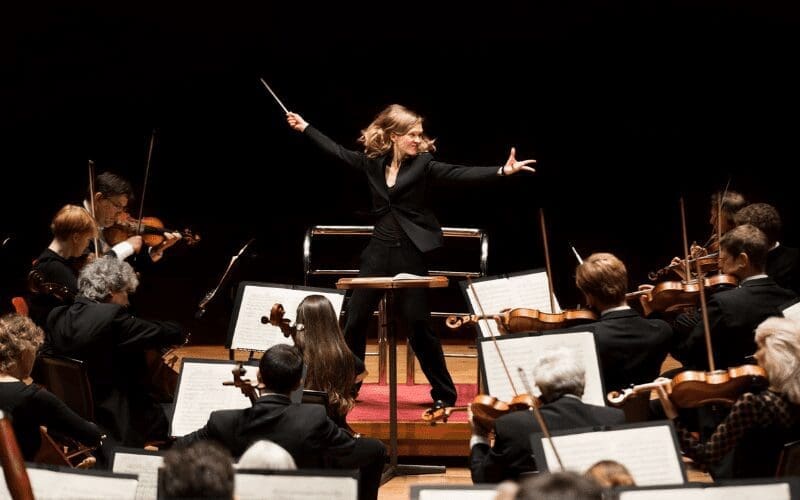
A music conductor directs an ensemble to allow them to fully step into and express the music. In this way, the role of a music conductor in an orchestra is very similar to that of a director in theatre or film.
Music conductors must possess a wide variety of skills. Conductors need musical comprehension to read and analyse orchestra conductor sheet music with many parts per page very quickly. They also need an excellent ear to hear the overall sound of the ensemble whilst picking out individual parts or players.
Further, confident visual direction is essential to give clear signals to instrumentalists. Finally, and perhaps most importantly, musical conductors need to be able to communicate sensitively. Whether that’s providing constructive criticism in rehearsals or subtle shifts in ‘feel’ during play. Communication should be open and inviting for the players.
In technical terms, conductors must have a clear beat pattern which they are able to modify and to give clear upbeats. How you give the upbeat can convey entry, tempo, dynamic, and energy. 3-beat patterns require conductors to move their hand or baton in a triangle pattern. 4-beat patterns are a little more complex.
Skilled musicians and conductors are said to have an internalised metronome. Enabling them to recognise if the performers are lagging or speeding up. This might sound easy. But it can be especially challenging in live settings when time can seem to move differently. Ensembles often tend to speed up with the rising energy of the music. Conductors must be able to hear this and rectify it at speed.
Why Is A Conductor Needed In An Orchestra?
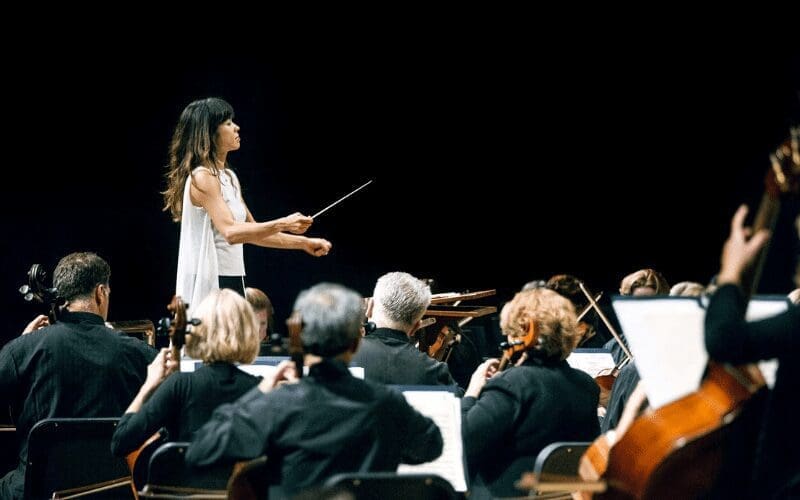
To play music together, different performers need to be playing at the same speed. A conductor provides the tempo for the orchestra.
Also important in music are clean entries, whether that’s the beginning of a movement where the whole orchestra enters, together, or a viola entry in bar 123. In Bruckner’s 4th Symphony, for example, there is just one cymbal crash in 70-minutes of music.
If the percussionist loses focus even for a second and forgets to count, they may miss their time to shine. A conductor will ensure this entry is indicated to them. A conductor ensures musicians don’t get lost in the music, miss their entries, and generally keeps the orchestra tight.
How Important Is A Conductor?
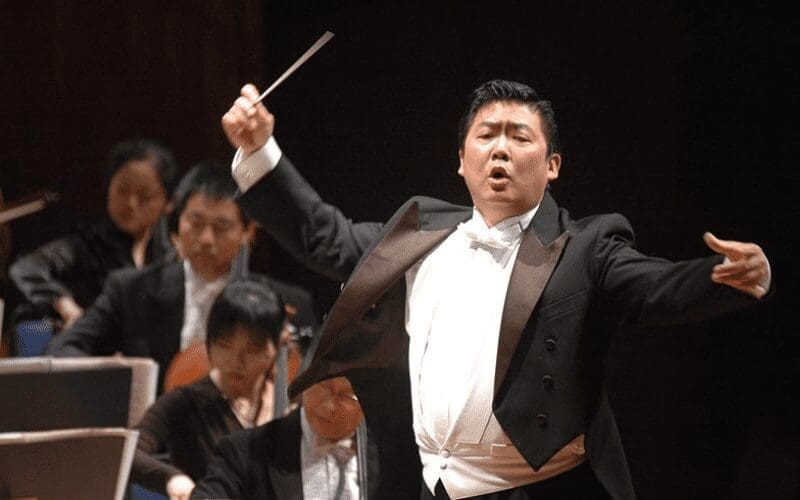
Fundamental. Music conductors are the glue that holds ensembles together.
Without them, even pro musicians struggle to maintain unity and cohesion.
The best conductors will also bring out aspects of the music that speak to them. Encouraging one part to sing out over the others, and guiding any rubato or dynamic changes smoothly.
What Does A Conductor Use To Conduct?
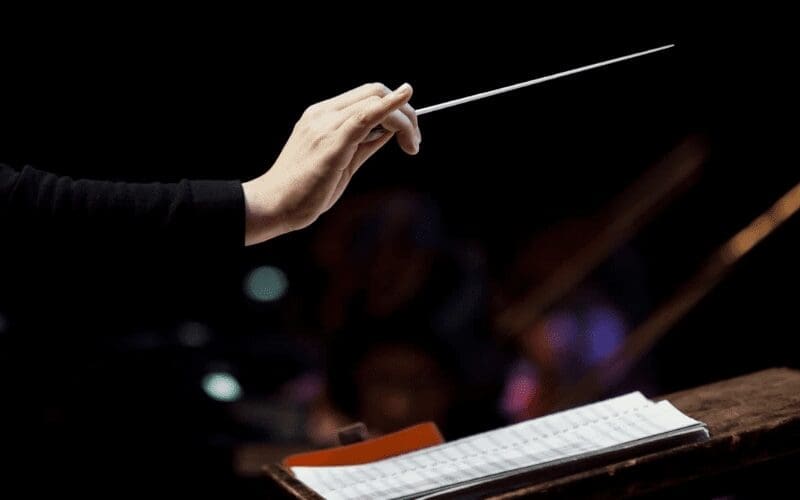
It’s all personal preference! But usually, the options are either hands or a baton (thin metal stick).
The rule of thumb is that with a smaller ensemble, hands are better for conveying expression as well as beat patterns.
However, for larger ensembles, e.g. symphony orchestras, a baton can be much more effective. Giving a point of focus for musicians who are multi-tasking at reading music and trying to see the conductor from relatively far away.
The baton can give more precision to music conductors of large orchestras.
It is entirely expected that the conductor of an orchestra will have and following sheet music. Although orchestra conductor sheet music contains all the parts so they will often be turning it at speed.
As a result, a conductor music stand is an essential kit for displaying all the music clearly at an appropriate height for the conductor to still give clear gestures to players.
When it comes to what these gestures are, individuals often have their own quirks, but mostly they should be intuitive for the musicians. When indicating dynamics, for example, bigger gestures whilst signalling the beat pattern indicate forte. While smaller gestures indicate piano.
Conductors also raise or lower hands to signal the dynamics or energy of the piece. To give cues, conductors usually use their fingers, hand, or baton to point at a section to enter.
Music Conductor Salary

The average salary of a music conductor in the UK is in the range of £16,900 to £25,100 per year, for entry or junior-level conductors.
Mid-level conductors’ salaries can be around £35,000-£40,000/per year. While experienced conductors often make more than £70,000/year.
Objectively, music conductors tend to earn below the national average. But polls would suggest job satisfaction is significantly higher than average. It’s also worth noting that music conductor salaries are much higher in the US than in the UK. Particularly at an experienced level.
Emerging music conductors looking for job opportunities will usually be considered on the basis of education and experience. It is not uncommon to expect professional conducting qualifications and specialisations. Such as choral conducting or orchestral conducting.
In the UK most music conductors have at least a bachelor’s degree in music. Although, increasingly, some have degrees in music conducting or music composition.
To act as a musical director in an educational environment (often a conducting post), a teaching qualification will usually be required in addition to a university degree and conducting experience/qualifications.
How To Be A Conductor
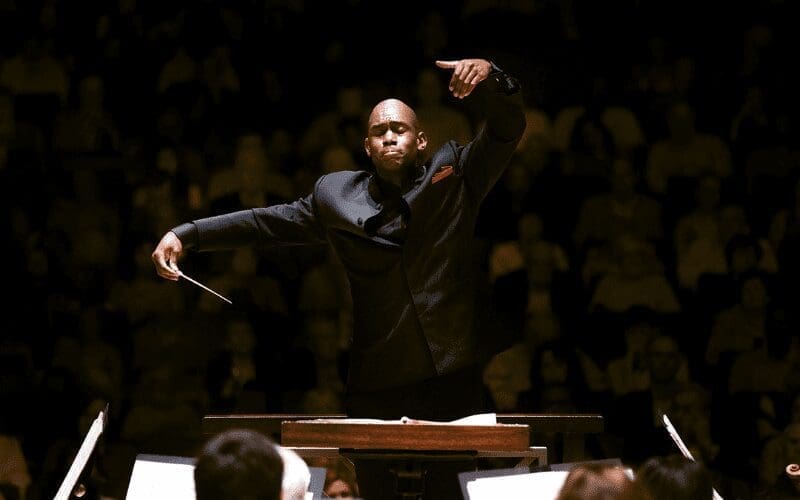
For aspiring music conductors at school, one of the best ways to gain experience is as a performer.
Joining relevant ensembles and working as a performer helps you see conducting from the perspective of an instrumentalist. You’ll learn valuable skills in reading and analysing orchestral scores. Additionally, you’ll improve your ear, and technique, and see exactly how conductors communicate in practice.
It’s always good to work your way up to leadership from within an ensemble. Often, for example, the first violin will give cues to the orchestra. If you’re a violinist in an ensemble, working towards becoming the first violin will give you a taste of leading a group of performers.
Education
At the university level, having an undergraduate degree in Music will be a major asset. Most Music Conducting courses in the UK are postgraduate entry only.
While completing an undergraduate degree, seek out as much work experience as possible. Whether that’s conducting for a university orchestra or shadowing conductors/pit bands in professional theatres.
If you can afford to, paid masterclasses with professional conductors can make a world of difference. As well as boosting your network beyond your university. It may be possible to gain funding from your institution for this.
The Royal College of Music, Northern College of Music, University of Birmingham and University of York all offer comprehensive postgraduate degrees in conducting. Music-conducting students work alongside mentors and courses will actively incorporate hands-on, ensemble conducting opportunities.
There are also other options for students who have gained postgraduates from music conservatoires to transition into working life. A conducting fellowship at Trinity Laban, for example, requires the student to lead ensembles, mentor younger students, undertake masterclasses with visiting professional conductors, and organise and participate in events at the music college.
In exchange, the student can receive a £6,000 grant towards their studies or other relevant expenses.
Royal Northern College of Music and Royal Conservatoire of Scotland also have junior conducting fellowships available. Such opportunities are highly sought after so do your research, apply in good time, and prepare thoroughly.
Now You Know All About Music Conductors
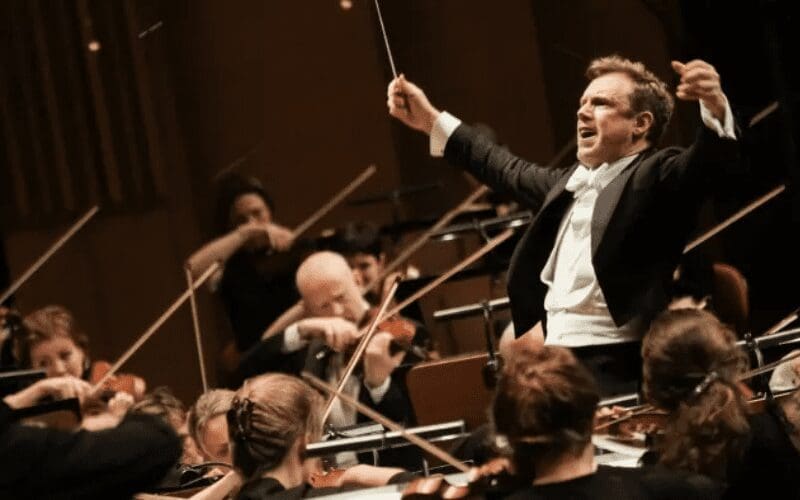
Hopefully, you feel a lot more confident with your knowledge of what music conductors do. As well as how much music conductors earn and how important music conductors are!
If you’re a musician, it’s likely you realised how much a good conductor can transform the sound of your ensemble. But you might not have realised it was a career available to you!
Unfortunately the elitist perception of music conducting as well as the underrepresentation of women and ethnic minorities used to put many talented musicians off the role.
However, there is a strong movement working towards changing this at present. Regardless of your background, you should feel confident that the industry is more diverse than ever. Being a music conductor is well within reach if you’re willing to work for it.
Conductors like Sarah Hicks, Principal Conductor for Minnesota Orchestra, and Mirga Gražinytė-Tyla, Music Director for the City of Birmingham Symphony Orchestra are worth checking out if you’re looking for some impressive female conducting role models!
We hope you enjoyed reading more about the different pathways to becoming a conductor and unpacking the skills needed for the hottest job in classical music.
We wish you all the best of luck in your music career!
Are you a Music Conductor? Tell us about your musical journey in the comment section below! Most importantly though, don’t forget to share this article on your socials and tag us @musicgateway! We love interacting with you all!
For musicians and producers an online metronome tool is essential when recording, try Music Gateway’s online metronome tool here.











